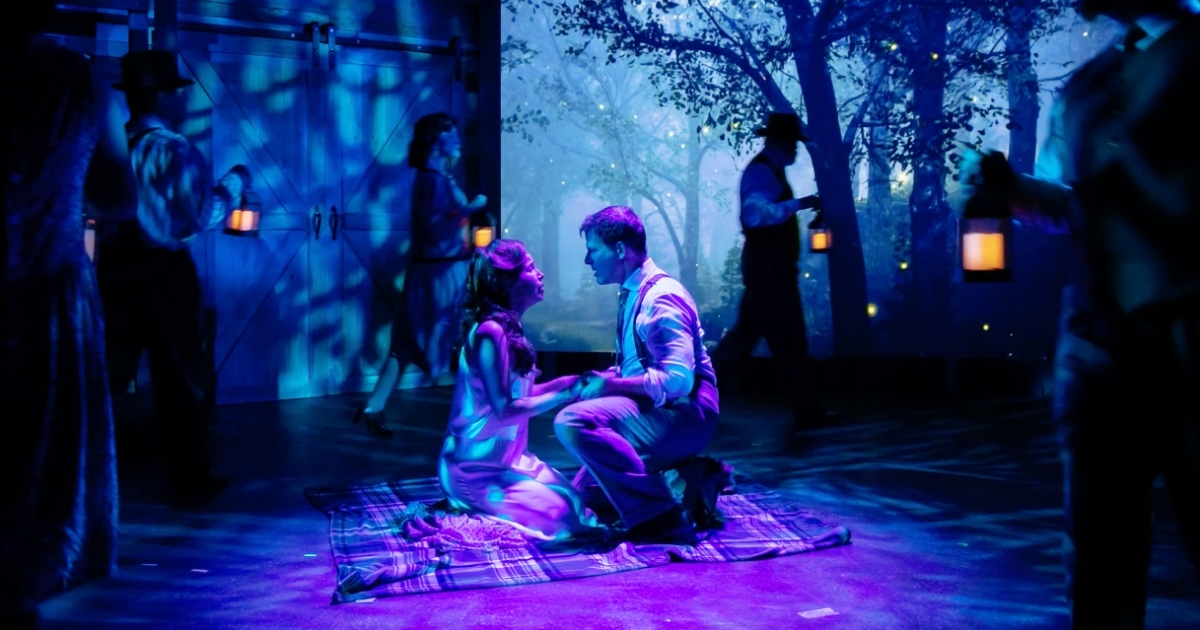Director Kathy Mulay wanted to bring the homespun bluegrass musical “Bright Star” to Farmers Alley Theatre in Kalamazoo since she saw it debut on Broadway six years ago. Its premiere at the regional theater was slotted for the 2019-2020 season, but was thwarted by the pandemic.
Now, her patience has paid off. As the closing fully-staged production of this season, it’s beautifully full of hope and heart — and clearly has been well worth the wait.
It’s a unique show that is tailored to Farmers Alley in every way, thanks to thoughtful direction and creative design that help bring to life this romantic tale of Americana and nostalgia through an extraordinary cast and their powerful performances.
With book by comic, actor, sometimes novelist and banjo player Steve Martin, and lyrics by pop singer Edie Brickell of The New Bohemians fame, “Bright Star” focuses on Alice Murphy, whom we meet as the editor of a literary magazine in Asheville, North Carolina in the 1940s, though her coming-of-age in the 1920s through love and trauma in a small country town nearby provides the central conflict of the story.
Her romance with Jimmy Ray Dobbs, son of the haughty mayor who has higher aspirations in mind for his son than marrying the bookish black sheep Alice, unfolds in scenes 20 years before the young Billy Cane returns from World War II with literary aspirations—and thrusts himself into Alice’s world to find her gentle encouragement if not instant success. The ways the two worlds and time periods emerge in a dual narrative is wonderfully compelling, and allows the story to unfold in both surprising and predictable ways that are often deeply sentimental but saved from sentimentality with wry humor and tremendous depth of feeling from the performers.
Far from a spectacle, this show’s strength is in its nuances; and the juxtapositions in its telling make the story ring so emotionally true and heart wrenching: the present and past, light and dark, aged wisdom and youthful exuberance, loneliness and romance, urban and rural, hootenanny and mournful ballad—all are present in the book and music as well as heightened by dramatic and technical choices in this fine production.
It’s an enormous show scaled to fit Farmers Alley’s small black-box space with clever design. Projected images on a screen center stage allow for dramatic changes in place, from cemetery to bookstore to barn to office to party, often providing terrific movement with moving pictures such as inside a train and car—all with a few key moving set pieces from co-scenic designers Kathy Mulay and Michael Borzkowski as well as carefully-chosen props by Savannah Draper to terrific effect. Lanford J. Potts’ lighting design also magnifies high valence moments as well as references to light in the script and songs; and in tandem with sound design from Tony Mitchell provides powerful symbolism and beauty, such as in a tender, intimate scene as well as a terrible storm as if foreshadowing before an event that changes everything.
And this extraordinary created world is populated by an exceptional ensemble with standout performances from key players. Michelle Duffy is a tremendous Alice, embodying the spunky, naive girl as well as the brilliant, sassy woman with incredible emotion both in her physicality and her voice. Her singing is gorgeous and also carries a phenomenal depth and range of emotion. She has terrific chemistry with Jeremy Koch as Jimmy Ray, and his skillfulness in capturing the range of age, emotion, and vocal strength necessary to the dual narration complements Duffy’s, his tumult quietly roiling beneath the surface. What they create together on stage feels so real it’s impossible not to get swept up in their story.
As a pair, they’re matched by Jason Koch in his phenomenal breakout performance as Billy Cane and Natalie Duncan as Margo Crawford. Their voices are magnificent and though they portray their respective characters in a singular time period, they capture nuanced emotion and make you fall in love with—and root—for them, even before the characters both know they’re a match.
But there are 12 other actors also magnificently filling the stage with character, emotion, and meaning, including Christopher Harrod as the heartbreakingly tender Daddy Cane contrasted by D. Neil Bremer’s nasty Mayor Dobbs and James Ilsley’s controlling Daddy Murphy who ultimately softens in time. Sandra Bremer also gives a noteworthy performance as Mama Murphy.
The small, intimate moments here are many, and the duets and harmonies are particularly powerful, though the contrasts between ballad and hootenanny as they come fast and furious give the show dynamic texture and never allow us to dwell in any one emotion or moment for long. Cole P. Abod’s fierce musical direction leads the way with his tight 8-piece band, and there’s plenty picking of strings, including terrific banjo playing from Mick Jutila. The music is so fine this show in concert would be worth the cost of admission.
But it would be a tragedy to miss the full story with its visual impact, including Kathryn Wagner’s lovely period costumes, Steve Hodges’ wonderful wigs, and Jeremy Blair’s tremendous, joyful choreography, that makes excellent use of the space, from little bursts of dance to the enormous festive number that opens Act II with gusto.
“Sun’s Gonna Shine” they boldly sing as they dance with joy, and it’s a radical proclamation. Theirs are dark times for so many reasons—as are ours. And yet here is upliftment. Redemption. Here is beauty. Joy. Here is grace.
“Bright Star” is a marvelous bookend to Farmers Alley’s first full season since the pandemic that began with “Songs for a New World,” another hopeful, implausible, radical act of live theatre. To be in the presence of what’s possible amid such uncertainty is inspiring and feels perhaps more necessary than ever.
Bright Star
Farmers Alley Theatre
June 23-July 10
https://www.farmersalleytheatre.com/shows/2021-22/bright-star





